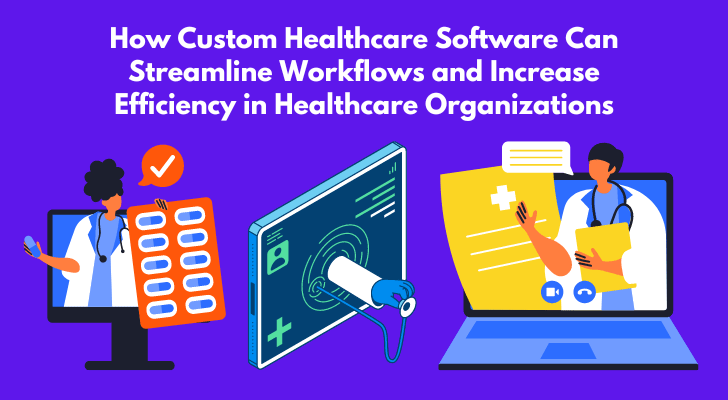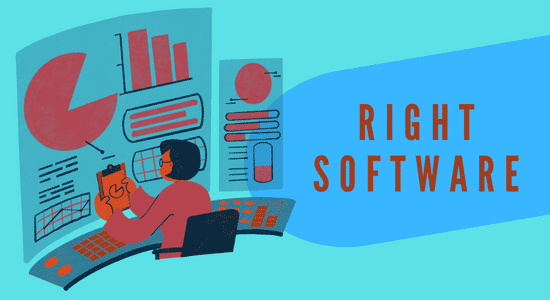Custom healthcare software can be an invaluable tool for healthcare organizations looking to streamline their workflows and increase efficiency. By leveraging advanced technology, healthcare organizations can benefit from improved data management, streamlined clinical processes, automated patient scheduling and billing systems, enhanced communication between care providers and patients, and more. Read on to learn about all the advantages of bespoke healthcare software for healthcare organizations.
The study shows that about 96% of United States hospitals use certified electronic health record technology (EHR) to track and manage operational flow data. Custom healthcare software can revolutionize the way healthcare organizations operate by streamlining workflows, enhancing communication, and improving data management. This technology is becoming increasingly popular among healthcare organizations as it offers numerous advantages in terms of efficiency and cost savings.
By leveraging advanced capabilities such as automated patient scheduling systems, enhanced communication between care providers and patients, streamlined clinical processes, and improved data management, healthcare organizations can benefit from increased efficiency, cost savings, and improved patient care. Let’s explore the ways that bespoke programs for the medical field can help health organizations streamline their operations and increase efficiency.

What is Custom Healthcare Software?
The healthcare industry is rapidly changing, and the demand for custom healthcare software (CHS) is increasing. It is a specialized application developed to provide tailored solutions for healthcare organizations.
It enables you to meet the needs of your patients and staff. CHS can be tailored to your specific workflow and needs. Furthermore, it can help improve patient satisfaction and create a better experience for everyone involved in your facility. You can use personalized healthcare software to:
- Make it simple for patients to access their medical records;
- Put all of the information your employees require at their fingertips;
- Streamline communication among all parties involved in patient care;
- Save money;
- Save time;
- Providing better quality care to their patients.
CHS can take many different forms, but they all share some important characteristics. They are user-friendly and designed to make it easier for users to access information, complete tasks, and communicate with one another. Thus, whether you are an intern working on research or a nurse who wants to discuss monthly patient data, you can share and discuss all the necessary information from any location using mobile devices, laptops, or desktops.
Top 20 Ways Custom Healthcare Software Can Streamline Workflows and Improve Efficiency in Healthcare Organizations
Healthcare organizations have hectic workflows. Furthermore, if not properly organized, they can quickly devolve into chaos. Health care involves not only managing patient data but also providing high-quality care.
Bespoke software enables you to not only streamline all workflow processes in a row but also manage them without the use of a digital device or constant double-checking. Here is how you can benefit from introducing it:
1. Improved Communication Between Care Providers and Patients
It can streamline communication between care providers and their patients by providing secure messaging solutions, secure video conferencing capabilities, and other features that allow for better collaboration.
2. Automated Billing Systems
This technology can reduce the time spent manually entering patient data into billing systems by automating the process. It can result in faster and more accurate billing.
3. Automated Patient Scheduling Systems
This product helps streamline the process of booking appointments, reducing manual labor while providing a more efficient way to schedule patients and staff. It can help improve patient satisfaction levels as they no longer need to wait long periods for an appointment.
4. Streamlined Clinical Processes
CHS can streamline clinical processes by providing access to patient medical records, lab results, and other relevant data in a secure environment. It can reduce the amount of time spent manually tracking down information or making sure all relevant data is entered into systems.
5. Improved Patient Care
It can help improve the quality of care provided to patients by providing clinicians with access to their complete medical records, allowing them to make more informed decisions about diagnosis and treatment. It also enables improved coordination between different departments in a healthcare organization, enabling faster responses to urgent needs and better continuity of care.
6. Automated Reminders for Patients
This technology can help improve patient adherence to treatment plans and reduce the time spent manually sending out reminder emails or text messages.
7. Enhanced Analytics Capabilities
Healthcare organizations can leverage this program to gain valuable insights into the performance of their business operations by utilizing advanced analytics tools such as predictive analytics and machine learning algorithms.
8. Improved Security Protocols
It can provide enhanced security protocols, such as multi-factor authentication, encryption, data masking, etc., that ensure sensitive patient information is kept safe from unauthorized access.
9. Increased Operational Efficiency
By streamlining workflows and increasing automation, bespoke software reduces the amount of manual labor required by staff and enables healthcare organizations to save time and money.
10. Improved Patient Experience
CHS provides a more efficient way for patients to book appointments, receive reminders, and access their medical information, all of which can help improve the overall quality of care they receive and enhance their satisfaction levels.
11. Reduced IT Costs
By leveraging bespoke software, healthcare organizations can reduce the need for manual data entry, thereby reducing the amount of time spent on IT maintenance tasks such as system updates and security patches. It can result in significant cost savings for an organization.
12. Improved Data Management
It can improve data management by providing a more efficient way to store and analyze patient data. It also enables healthcare organizations to create detailed reports that help identify areas for improvement within the organization’s operations.
13. Increased Scalability
By utilizing cloud-based solutions, healthcare organizations can quickly scale their CHS to meet the changing needs of their business operations.
14. Improved Regulatory Compliance
It can help ensure organizations are compliant with applicable state and federal laws by providing features such as secure data storage, automated reporting capabilities, etc.
15. Automated Inventory Management
This technology can provide automated tools for tracking medical supplies, inventory levels, and ordering new items, all of which can significantly reduce manual labor and operational costs associated with procurement processes.
16. Optimized Workflow Processes
Healthcare organizations can leverage this program to optimize workflow processes by creating digital forms that streamline data entry tasks and eliminate the need for manual data entry. It can reduce the amount of time spent on administrative tasks and enable staff to focus more attention on patient care.
17. Improved Clinician Collaboration
It can provide clinicians with access to a shared database of medical information, enabling them to collaborate and make decisions more quickly. It can result in improved patient outcomes by providing faster diagnosis and treatment times.
18. Enhanced Reporting Capabilities
Healthcare organizations can leverage bespoke software to gain better insights into their business operations by utilizing powerful reporting tools such as dashboards and analytics. These tools allow for easy monitoring of performance metrics that are critical for decision-making and strategic planning purposes.
19. Increased Data Accuracy
By utilizing automated processes such as optical character recognition (OCR) and natural language processing (NLP), healthcare organizations can reduce errors caused by manual data entry, resulting in more accurate records that are useful for reporting and research purposes.
20. Improved Decision-Making
It can help organizations make more informed decisions by providing real-time analytics and insights into patient data, enabling them to identify potential opportunities for improvement. It can result in better patient outcomes and increased operational efficiency.
How to Choose the Right Bespoke Software for the Healthcare Industry

Choosing the right software solution for your organization can be a daunting task. With so many options available, you should ensure you select the one that meets all your needs. Here are the top 10 things to consider before choosing one for your needs:
- Security: Data security is paramount in the healthcare industry, so make sure the software you choose is compliant with HIPAA regulations and other security standards.
- Features: Carefully consider all the features offered by different vendors to ensure you are getting a solution that meets your specific needs.
- Usability: Make sure you select intuitive software that is easy to use for everyone in your organization.
- Scalability: Choose a solution that can scale with you as your practice grows and evolves.
- Compatibility: Ensure the product is compatible with other applications you already use or plan to implement in the future.
- Support and Maintenance: Get an understanding of the vendor’s support and maintenance policies to ensure you get the help you need when something goes wrong.
- Budget: Know what your budget is and prioritize features that are most important for your practice within that price range.
- Integration: Look for a solution that offers integration with existing systems such as EHRs, practice management systems, and billing software.
- Training and Education: Get an understanding of how the vendor provides training and education for using their product to ensure your staff is comfortable with it.
- Customization: Make sure the software can be customized to meet your specific needs.
Conclusion
Custom healthcare software can make all the difference when it comes to streamlining workflows and increasing efficiency in healthcare organizations. It eliminates redundant information and cumbersome processes, which leads to fewer mistakes, more accuracy, and a more likely resolution of health-related issues.
All these factors contribute greatly to improving workflow management and overall productivity within healthcare organizations. By investing in robust CHS today, organizations can ensure their teams make informed decisions based on up-to-date insights concerning various areas of their business, ultimately leading to greater success tomorrow.

Author Bio: Anna Medina
Anna is a specialist in different types of writing. She graduated from the Interpreters Department, but creative writing became her favorite type of work. Now she improves her skills while working as a specialist at writing service website GrabMyEssay to assist a lot of students all over the world and has free time for other work, as well. Always she does her best in the posts and articles.

Thanks for your valuable article, Anna. Very useful.